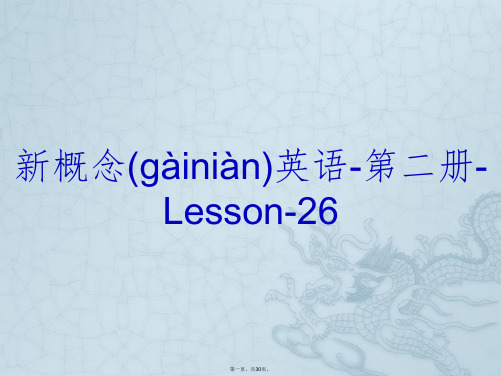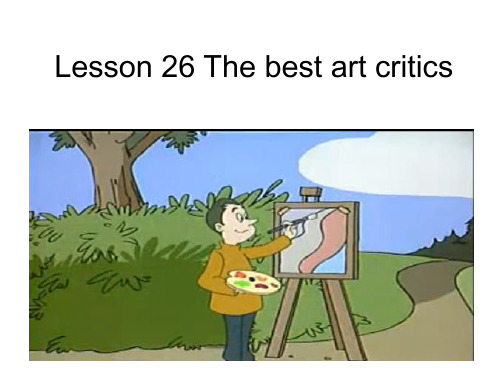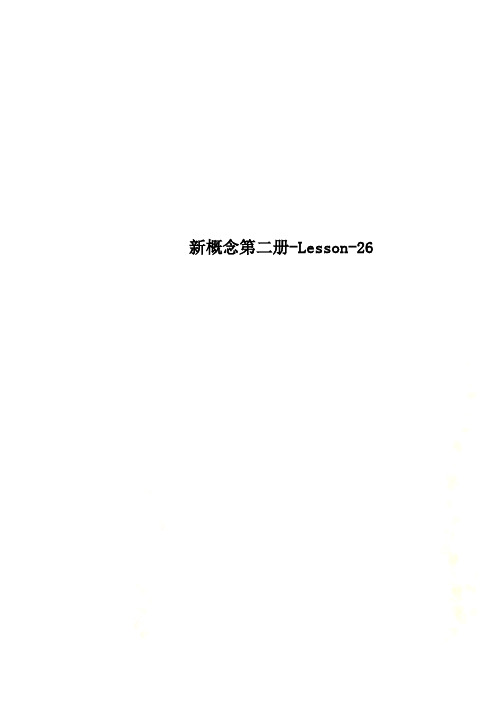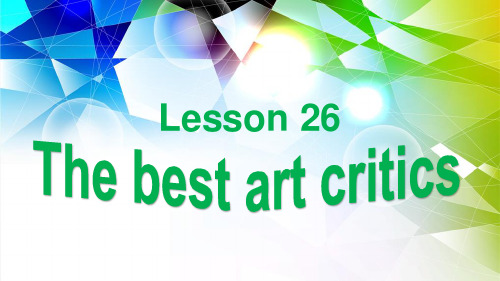新概念英语第二册学生用书Lesson26
新概念英语第二册Lesson26课件

whether (if) 是否/无论/不管
thank sb (for sth / for doing sth)感谢某人某事/做某事; else 其它的/别的(位于不定代词或wh-疑问词后)
Lesson 26 The best art critics 重难点巩固
I think that young children often appreciate modern pictures better(更/更好地) than anyone else. appreciate v. 感激;欣赏 表示“感谢,感激”时,thank和appreciate有很大区别,如下: ①thank表示“感谢”,习惯上只接“人”作宾语,常用搭配是thank sb (for sth / for doing sth) →She said goodbye and thanked us for coming. 她说再见,感谢我们的到来。 →Thank you for your help. 感谢你的帮助。 ②appreciate表示“感激”时,习惯上只能接“事”作宾语,后跟名词,动名词或代词it代指的事情。 常用搭配:appreciate doing sth. 例如: →I appreciate it. 我对此事表示感激。 →He appreciated my help. 他感谢了我的帮助。 →Mary appreciated being helped. 玛丽感谢得到了帮助。(玛丽感谢被帮助了。)
[翻译]: 他是否来参加我的生日派对非常重要。
[翻译]: 我不知道她是否看到了那条通知。
[翻译]: 不管明天是否下雨,我们都要去野餐。(主将从现)
[翻译]: 周末我们经常出去闲逛。
Lesson 26 The best art critics 重难点巩固
新概念英语-第二册-Lesson-26

pretend pattern
v. 假装 n. 图案
curtain material
n. 窗帘,幕布 n. 材料
appreciate v. 鉴赏
no. 是否 v. 悬挂,吊
critically adv. 批评地 upside down 上下颠倒2地
They pretended to have been married.
6
第六页,共30页。
★pattern n. 图案(tú àn) ① n. 图案(tú àn) You can make a dress from this paper pattern. ② n. 模式, 典范
★curtain n. 窗帘,门帘 ring up / down the curtain
Beijing .
Beijing is larger than any city in China. Beijing is larger than any other city in China.
1.要注意比较的事物的前后(qiánhòu)一致性。
2.用比较级表达最高级的时候,如果是A个体
I looked at it again. She was right! It was! 13
第十三页,共30页。
参考译文: 我是个学艺术的学生, 画了很多画. 有很多人装 成很懂现代艺术的样子(yàng zi), 总是告诉你一 幅画的 “意思〞 是什么. 当然, 有很多画是什么 “意思〞 也没有的. 它们就是些好看的图案, 我 们喜爱它们就像我们喜欢漂亮的窗帘布一样. 我 觉得小孩子们往往比任何人都更能欣赏现代绘画, 他们观察到的东西更多. 我的妹妹只有7岁, 但她 总能说出我的画是好还是坏. 昨天她到我房里来 了.
新概念第二册第26课

Learn to pretend
• Act like an actor in the following conditions: 1.You are copying homework from others when
the teacher comes in. You will pretend … 2. You are playing with curtains during a class
2. Do many people really understand modern art or not?
No, not many people undertand modern art.
3. Do paintings always have a meaning or not?
No, not necessarily. Many are not 'about' anything.
假装
鉴赏 _一__名__学__艺__术__的__学__生__
漂亮的图案 同样地 漂__亮__的__窗__帘__布____ 观察到的更多 上下倒置
• Who is the art student's best critic?
Who is the art student's best critic?
• notice more
观察到的更多
• upside down
上下倒置
Challenge your memory
• _p_r_e_te_n_d • _a_p_p_r_e_c_ia_t_e • an art student • _p_r_e_tt_y_p__a_tt_e_r_n_s • i_n__th_e__s_a_m_e__w_a_y • pretty curtain material • n_o_t_i_ce_ more • _u_p_s_i_d_e_d_o_w__n
新概念第二册-Lesson-26

新概念第二册-Lesson-26新概念二Lesson26课堂内容The best art criticsI am an art student and I painta lot of pictures. Many people pretend that they understand modern art. They always tellyou what a picture is 'about'.Of course, many pictures arenot 'about' anything. Theyare just pretty patterns. WePart 1 Basic words and expressions1. art n. 艺术art student 艺术系的学生I am an art student.English student 学英语的学生student of England 英国学生art gallery 艺术画廊(gallery n. 长廊, 游廊;画廊)black art 巫术【词汇相关】artist n. 艺术家artiste n. 艺人2. critic n. 评论家【词汇相关】criticize v. 批评, 批判(主要指批判, 但不完全是责备的意思)He criticized my painting.criticism n. 批评, 批判critical adj. 挑剔的You are critical.critically adv. 爱挑剔的3. paint v. 画draw a picture 用线条画paint a picture强调油画painting n. 画oil painting 油画;Chinese painting 中国国画Beijing opera 国戏, 京剧4. pretend v. 假装pretend to do sth. 假装…When his mother came in,the baby pretended to go to sleep.pretend that +从句假装…5. pattern n. 图案① n. 图案pattern drills② n. 模式, 典范6. material n. 材料listening material 听力材料7. appreciate v. 鉴赏=understand and enjoyappreciate sth. 感激……I appreciate your help. 我很感激你的帮助appreciate doing sth. 我很喜欢做某事【词汇拓展】enjoy v. 欣赏,得到享受,乐趣I like…I love…I enjoy…I appreciate…(程度一个比一个深)I like sth.I like sth. very much.I like sth. better.I like sth. best.8. notice v. 注意到① vt. 注意到,察觉到(不用进行时)You never notice what’s going on around you.notice 细节上的注意, 往往是别人没注意的东西, 你注意到了, 细节上的东西I notice the beauty spot.(美人痣)pay attention to 思想上的注意② n. 注意,察觉The girl in red caught his notice.③ n.(书面的)通知,布告,海报I know there’s a meetin g, because someone put up a notice outside the Town Hall.9. whether conj. 是否if在表示“是否”的时候可以被whether所取代;if 在表示“如果”的时候不可以用whether取代whether…or not =ifIf it will rain… (不是条件状语从句, 故可以用将来时will)=Whether it will rain…/Whether it will rain or not…(可以加“not” )I wondered if it will rain.(不加“not” )10. hang v. 悬挂, 吊① vt.&vi(将……)悬挂,吊A pretty curtain hangs over the window.hang — hung — hung v. 悬挂The coat was hung.hang — hanged — hanged v. 绞死, 吊死The thief was hanged.② vt.&vi 垂下John was very tired. He sat in a chair and hung (down) his head.③ vt.&vi安装……使能转动/摆动Have you hung the door? 你把门装上了吗?11. upside down 上下颠倒地①上下颠倒When he stands on his head, everything appears upside down to him.②乱七八糟,混乱不堪My little boy always makes the room upside down.These men have made the whole country upside down.Part 2 Passage Analyze1、They are just pretty patterns.just在此处指“只是,仅仅(是)”It was just a wrong number.just另一个意思是“刚才,正好,正是”It’s just six o’clock.I’ve just heard the news.2、We like them in the same way that we like pretty curtain material.pretty curtain material 漂亮的窗帘布in the same way that =as… 正如……一样The son walked in the same way that/as his father walked.I love you in the same way that I love my father.I love you just in the same way that I love money.in a way以某种方式3、I think that young children often appreciate modern pictures better than anyone else.else跟在anyone, anything 等不定代词的后面,表示“另外/加、其它/他的、不同的”,else也可跟疑问代词连用,如who else,what elseI can find nothing else here except an old dictionary.They can appreciate modern arts best.better than anyone else 比其他任何人(表示最高级的含义)用比较级表示最高级:The teacher is the tallest.The teacher is taller than anyone else. (“else”不能少, 把主语从“anyone”中排除)The book is more expensive than anything else.4、My sister is only seven, but she always tells me whether my pictures are good or not.连接词whether…or not可以表示选择:I don’t know whether you are interested (in it) or not.You must help him, whether you like him or not.不管你是否喜欢他,你(都)必须帮助他。
新概念英语第二册 Lesson26 Lesson26 The best art critics

• ★pattern n. 图案 • ① n. 图案 • ② n. 模式, 典范 the same pattern
3. pretend
• 1).pretend to do sth.
• 2)pretend to be doing sth 假装正 在做。。。。。
黄菡
乐嘉
Critics(评论家)
• ★paint v. 画
• draw a picture 用线条画 • paint a picture 强调油画 • painting n. 画 • oil painting 油画 ;Chinese painting 中国
国画
• ★pretend v. 假装 • pretend to do sth. 假装…… • pretend to be doing sth 假装正在做。。。。。 • Anna pretended to be reading when Lucy
• 选出下列句子中可以用 if替换whether 的句子: • A.The news whether our team has won the
game is not known.
• B.The discussion focused on whether they would buy a new car.
upside down.
Critic, pretend, art, paint
B。生词学习---6分钟
• 8.appreciate v. 鉴赏 • 9.notice v. 注意到 • 10.whether conj. 是否
B。生词学习---6分钟
• 11.hang v. 悬挂,吊 • 12.critically adv. 批评地 • 13.upside down 上下颠倒地
新概念英语第二册课件ppt第26课Lesson26

I love you more than anything else in the world.
The teacher is the tallest. The teacher is taller than anyone else. The watch is the most expensive
还记得那些年我们一起 学过的宾语从句么?
I hate the scorching summer. I’m fond of sitting under the tree. I bought myself a watermelon.
宾语 介宾
直宾
还记得那些年我们一起 学过的宾语从句么?
宾语从句: 在Vt. 后或介词后
the picture is about what is the picture about? what the picture is about
找词 变式还原
I can tell you
比较表最高
I think that young children often appreciate modern pictures better
My little boy always makes the room upside down.
turn upside down
把…颠倒过来/把…变得狼藉
别逼我,我随随便便就可以 把你倒着打 Don’t push me, I can turn you upside down easily and beat you.
①从属连词:that,if,whether ②连接代词who, whom ,whose ,what , which等.
③连接副词when, where, why, how
新概念英语第二册Lesson26

paint • painter n. 画家,油漆工 • painting n. 画 oil painting 油画 Chinese painting 中国国 画
pretend v. 假装 • pretend to do sth.
她假装知道答案。
假装做......
She pretended to know the answer.
Lesson 26
New words
art • artist • artiste • arts • science n. 艺术 【U】 艺术家 ,画家 艺人 文科 理科
critic
n. 评论家 a literary critic
a music critic
• criticise
• critical
他问我:“你看过那部电影吗?” 他问我。He
asks me. I ever seen that film?
that if / wether
我看过那部电影吗? Have
He asks me if /wether I have ever seen that film?
He knows 不了现代艺术。
appreciate
• appreciate doing sth. 喜欢做......
I like... < I love... < I enjoy... < I appreciate...
notice • 1)v. 注意到 (细节上的注意,别人没注意到,你注意到了) • notice sb. do sth. pay attention to... • notice sb. doing sth. 思想上的注意 • notice + that 从句
(精美制作) 新概念第二册 Lesson 26

注意事项
d. 当 said, askd等词置于引语之间时,句子的后半部分以小 写字母开始。 e. 当一个新的说话人开始讲话时,要另起一个段落 。
用引号改写以下对话∶ Look! she said, isn't that man drunk? I think we should cross the road, answered her husband. It's too late now, she replied. Eh, you two. Look where you're going, called the drunk. Can't you walk in a straight line?
I would appreciate it if you paid in cash. v. 感激 n. 欣赏,感激 appreciation[əˌpriːʃiˈeɪʃn]
notice v. 注意,通知,察觉到 notice sb. do / doing sth. 不好意思,我没注意到你在打电话。 Sorry, I didn't notice you having a phone call.
She came into my room yesterday.
Section 4
'What are you doing?' she asked.
'I'm hanging this picture on the wall,' I answered.
'It's a new one. Do you like it?'
连词 ccrrititicicaallyly
art n. 艺术,美术 词组:art student 艺术系的学生 派生:artist n. 艺术家 arts n. 文科 理科? Sciences
- 1、下载文档前请自行甄别文档内容的完整性,平台不提供额外的编辑、内容补充、找答案等附加服务。
- 2、"仅部分预览"的文档,不可在线预览部分如存在完整性等问题,可反馈申请退款(可完整预览的文档不适用该条件!)。
- 3、如文档侵犯您的权益,请联系客服反馈,我们会尽快为您处理(人工客服工作时间:9:00-18:30)。
Lesson 26 The best art critics 最佳艺术评论家家最佳艺术评论艺术评论First listen and then answer the question.听录音,然后回答以下问题。
Who is the student's best critic?I am an art student and I paint a lot of pictures. Many people pretend that they understand modern art. They always tell you what a picture is ‘about’. Of course, many pictures are not ‘about’ anything. They are just pretty patterns. We like them in the same way that we like pretty curtain material. I think that young children often appreciate modern pictures better than anyone else. They notice more. My sister is only seven, but she always tells me whether my pictures are good or not. She came into my room yesterday. ‘What are you doing?’ she asked. ‘I'm hanging this picture on the wall, ’ I answered. ‘It's a new one. Do you like it?’She looked at it critically for a moment. ‘It's all right, ’ she said, ‘but isn't it upside down?’ I looked at it again. She was right! It was!New words and expressions 生词和短和短语语art(title)/a:t/n.艺术appreciate(1.6)/+'pri:Mieit/v.鉴赏critic(title)/'kritik/n.评论家notice(1.7)/'n+utis/v.注意到paint(1.1)/peint/v.画whether(1.8)/'weJ+/conj.是否pretend(1.2)/pri'tend/v.假装hang(1.11)/h$R/(hung/h)R/, hung)v.悬挂,吊pattern(1.4)/'p$t+n/n.图案critically(1.12)/'kriti?kli/adv.批评地curtain(1.5)/'k*:tn/n.窗帘,幕布upside down(1.12)/?)psaid-'daun/上下颠倒地material(1.5)/m+'ti+ri+l/n.材料文注释释Notes on the text 课文注1 art student,学美术的学生。
2 They always tell you what a picture is‘about’. 他们总是告诉你一张画的“意思”是什么。
很明显,作者认为那些自以为懂得现代艺术的人的评论根本不着边际。
因此,把about(“对画的分析”)这个词放在引号里,以示一种讽刺的口吻。
3 It's a new one. 这是一幅新画。
句中的one用来代替前一句中的名词 picture,以免重复。
参考译文我是个学艺术的学生,画了很多画。
有很多人装成很懂现代艺术的样子,总是告诉你一幅画的“意思”是什么。
当然,有很多画是什么“意思”也没有的。
它们就是些好看的图案,我们喜爱它们就像我们喜欢漂亮的窗帘布一样。
我觉得小孩子们往往比任何人都更能欣赏现代绘画,他们观察到的东西更多。
我的妹妹只有7岁,但她总能说出我的画是好还是环。
昨天她到我房里来了。
“你在干什么呢?”她问。
“我正把这幅画挂到墙上去。
”我回答说,“这是幅新画,你喜欢吗?”她用挑剔的目光看了一会儿。
“还可以吧。
”她说,“不过,是不是挂倒了?”我再次看了看画。
她说对了!是挂倒了!摘要写写作summary writing 摘要Answer these questions in not more than 70 words.回答下列问题,将答案组成一个段落,不要超过70个单词。
1 Does the writer study art, or does he study music? Does he paint a lot of pictures or not?(and)2 Do many people really understand modern art or not?3 Do paintings always have a meaning or not?4 Are they sometimes pretty patterns or not?5 Do young children appreciate modern paintings better than others or not? Do they notice more or not?(not only…but)6 When did the writer's young sister go into his room? Did she examine his new picture or not?(and)7 Had he hung it upside down, or had he hung it the right way up? Did she notice this immediately or not?(and)作文Composition 作文Rewrite these sentences using the correct verbs and joining words:改写以下句子,选用正确的动词和连词:I (looked at)(watched)the picture(but)(and)I could not(understand)(realize)it. It was in black and white and was (called)(named)‘Trees and snow’. I could see(neither)(not only) trees(or)(nor)snow.Letter writing 书信写作Which of the following headihgs is correct?下列信头中哪一个是正确的?John Madgewick, Grafton St. , 14, 14 Grafton St. ,14 Grafton St. , Croydon, Croydon,Croydon, Surrey, Surrey,Surrey, England. England.England. 24th April, 19__ 24th April, 19__Key structures 关键句型关键句型句型These things always happen. 经常发生的事情a I am having breakfast. Do you always get up so late?(Now and Always KS2 见第2课的关键句型)b The earth goes round the sun. 地球围绕太阳转。
The sun rises in the east and sets in the west. 太阳从东方升起,在西方落下。
c We rarely put-ing at the end of these verbs: 以下动词很少用于进行时态:appear, apprreciate, believe, feel, forget, hear, know, like, look like, notice, remember, resemble, see, think(that), understand.These verbs tell us what always happens:这些动词告诉我们经常发生的事情:I hear that you like classical music. 我听说你喜欢古典音乐。
I remember Tom very well. Do you know him? 我很清楚地记得汤姆。
你认识他吗?Exercises 练习练习A Underline the verbs in the passage that tell us what always happens and those which tell us what is happening now.将课文中描述经常发生的动作和正在发生的动作的动词选出来。
B What is happening? What always happens? 现在进行时和一般现在时Give the correct form of the verbs in parentheses:用正确的时态填空:‘Some people still (believe) the world is flat, ’he said.‘You (joke), ’ I replied. ‘I (not know) anyone who does. ’‘Well, you (know) me, ’he replied. ‘I (believe) that the earth is flat. I met a man the other day. I (forget) his name now.He said that the earth (look) like a flat dish. ’‘ ______ you (try)to tell me that you (believe) him?’I asked.‘I certainly do, ’he answered. ‘I (think) that he is right. ’‘And which side of the dish ______ you (live) on?’‘Oh, I (not know). He didn't tell me that!’special difficulties 难点Speech marks 引号In written conversation, we put speech marks (‘…’) or (“…”) round the words that are actually spoken. 在书面会话中,我们用引号(单引号或双引号)把实际的对话括起来。
